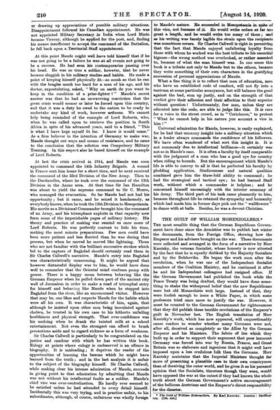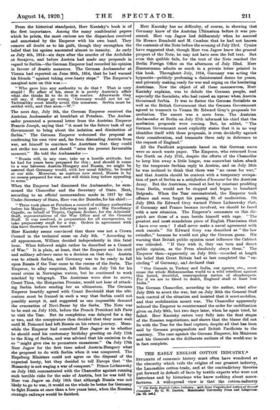THE GUILT OF WILLIAM HOHENZOLLERN.*
THE most sensible thing that the German Republican Govern- ment have done since the Armistice was to publish last winter the documents, from the Foreign Office, showing how the Emperor and his advisers brought on the war. These documents were collected and arranged in the form of a narrative by Herr Kautsky, the veteran Socialist, whose honesty is now attested by the fact that he is equally disliked by the Majority Socialists and by the Bolsheviks. He began the work soon after the revolution, when he was one of the Independent Socialist members of the Coalition Ministry, and he continued it after he and his Independent colleagues had resigned office. If the German Government had published the book while the Peace Treaty was being drafted, they would have done some- thing to shake the widespread belief that the new Republicans were but old Monarchists writ large. Instead of that, they were foolish enough to issue a White Paper, in which some professors tried once more to justify the war. However, it must be counted to the German Government for righteousness that they did publish these terrible revelations of the Emperor's guilt in November last. The English translation of Herr Kautsky's work, which has now appeared, will unquestionably cause readers to wonder whether many Germans were not, after all, deceived as completely as the Allies by the German Emperor and his Ministers. The fabric of lies which they built up in order to support their argument that poor innocent Germany was forced into war by Russia, France, and Great Britain was so elaborate and ingenious that it might well have imposed upon a less credulous folk than the Germans. Herr Kautsky maintains that the Imperial Ministers thought far more of presenting a plausible case to their own countrymen than of deceiving the outer world, and he gives it as his personal opinion that the Socialists, timorous though they were, would have opposed the war at the outset if they had known the whole truth about the German Government's active encouragement of the bellicose Austrians and the Emperor's direct responsibility for the-disaster.
• The ChAlto fWilliam Hohenzollern, By Karl Kautsky. London : Sketring. ton. [Ns. net.)
From the historical standpoint, Herr Kantsky's book is of the first importance. Among the many confidential papers which he prints, the most curious are the dispatches received and annotated by the Emperor with his own hand. They remove all doubt as to his guilt, though they strengthen the belief that his egoism amounted almost to insanity. As early as July 4th, 1914--six days after the murder of the Archduke at Serajevo, and before Austria had made any proposals in regard to Serbia—the German Emperor had recorded his opinion in favour of drastic measures. The German Ambassador at Vienna had reported on. June 30th, 1914, that he had warned his friends " against taking over-hasty steps." The Emperor's marginal note on this was :-
" Who gave him any authority to do that ? That is very stupid ! No affair of his, since it is purely Austria's affair what she thinks fit to do in this matter. Afterwards they will say, if things go wrong, Germany would not let us.' Tschirschky must kindly avoid this nonsense. Serbia must be settled with, and that soon.—W."
The next day, July 5th, the German Emperor received the Austrian Ambassador at breakfast at Potsdam. The Ambas- sador presented a personal letter from the Austrian Emperor Francis Joseph, saying that " it must be the future task of my Government to bring about the isolation and diminution of Serbia." The German Emperor welcomed the proposal as confirming his own view and, far from dissuading Austria from war, set himself to convince the Austrians that they could not strike too soon and should " seize the present favourable moment." He told the Ambassador :—
" Russia will in any case, take up a hostile attitude, but he had for years been prepared for this ; and should it come to a war between Austria-Hungary and Russia, we might be assured that Germany would, with her usual fidelity, be found at our side. Moreover, as matters now stood, Russia is by no means prepared for war, and will think long before appealing to arms."
When the Emperor had dismissed the Ambassador, he sum- moned the Chancellor and the Secretary of State. Next, according to an official memorandum made in 1917 by the Under-Secretary of State, Herr von der Bussche, for his chief :-
" There took place at Potsdam a council of military authorities before his Majesty. The following took part : His Excellency Capelle, on behalf of Tirpitz, Captain Zenker, for the Admirals' Staff, representatives of the War Office and of the General Staff. It was resolved, in preparation for all emergencies, to take preparatory stag; for a war. Orders in agreement with this have thereupon been issued."
Herr Kautsky seems convinced that there was not a Crown Council in the technical sense on July 5th. " According to all appearances, William decided independently in this fatal hour. What followed might rather be described as a Council of War." It is plain, at least, that the Emperor and his civil and military advisers came to a decision on that day. Austria was to attack Serbia, and Germany was to be ready to fall upon Russia if the Tsar came to the rescue of the Serbs. The Emperor, to allay suspicion, left Berlin on July 7th for his usual cruise in Norwegian waters, but he continued to work mischief by telegraph. The Austrians were slow to move; Count Tisza, the Hungarian Premier, would not hear of attack- ing Serbia before sending her an ultimatum. The German Emperor heartily agreed with Count Berchtold that the ulti- matum must be framed• in such a way that Serbia could not possibly accept it, and suggested as one impossible demand the evacuation of Novi-Bazar by the Serbs. The Note was to be sent on July 15th, before the French President left Paris to visit the Tsar. But its completion was delayed for a day or two, and the conspirators then decided that they must wait until M. Poineare had left Russia on his return journey. Mean- while the Emperor had consulted Herr Jagow as to whether he should send his customary birthday greeting on July 11th to the King of Serbia, and was advised that his omission to do so " might give rise to premature uneasiness." On July 17th Herr Jagow for the first time asked Austria-Hungary what she proposed to do with Serbia when it was conquered. The Hapsburg Ministers could not agree on the disposal of the expected booty, but they decided to tell Europe that " the Monarchy is not waging a war of conquest." Prince Lichnowsky on July 16th remonstrated with the Chancellor against running such terrible risks for the sake of Austria, but he was told by Herr von Jagow on July 18th that although Russia was not likely to go to war, it would on the whole be better for Germany to fight Russia at once than a few years later, when the Russian strategic railways would be finished.
Herr Kautsky has no difficulty, of course, in showing that Germany knew of the Austrian Ultimatum before it was pre- sented. Herr von Jagow lied deliberately when he assured
Sir Horace Rumbold and M. Cambon that he had not known the contents of the Note before the evening of July 23rd. Cynics have suggested that, though Herr von Jagow knew the general purport of the Note, he may not have seen the full text. But even this quibble fails, for the text of the Note reached the
Berlin Foreign Office on the afternoon of July 22nd. Herr
Zimmermann admits as much in a private letter printed in this book. Throughout July, 1914, Germany was acting the hypocrite—publicly professing a disinterested desire for peace, and privately making ready for war and urging on the hesitating
Austrians. Now the object of all these manoeuvres, Herr Kautsky explains, was to delude the German people, and especially the Soeialists, who had raised an uproar when Austria threatened Serbia. It was to flatter the German Socialists as well as the British Government that the German Government agreed to transmit to Vienna Sir Edward. Grey's proposals for mediation. The assent was a mere form. The Austrian Ambassador at Berlin on July 27th informed his chief that the mediation proposals were coming. But, he added, " The German Government most explicitly states that it in no way identifies itself with these proposals, is even decidedly against their consideration, and transmits them only in deference to the request of England."
All the Pacificist arguments based on this German move were so much waste paper. The Emperor, who returned from the North on July 27th, despite the efforts of the Chancellor to keep him away a little longer, was somewhat taken aback
by the temperate Serbian reply to Austria, and on July 28th he was inclined to think that there was " no cause for war," and that Austria should be content with a temporary occupa- tion of part of Serbia as a satisfaction d'honneur for the Austrian Army. But the Austrians, roused at last by constant prodding from Berlin, would not be stopped and began to bombard
Belgrade. When the Tsar remonstrated, the Emperor took
offence and soon forgot his passing fit of moderation. On July 29th Sir Edward Grey warned Prince Lichnowsky that, if Germany and France became involved, we should be faced with a new situation. The Emperor's comments on this dis- patch are those of a man beside himself with rage. The greatest and most scandalous piece of English Pharisaism that I have ever seen ! I shall never make a naval agreement with such rascals." Sir Edward Grey was described as " the low swindler," because he would not play the German game. His warning that British public opinion must influence the Cabinet
was ridiculed. " If they wish it, they can turn and direct public opinion, as the Press absolutely obeys them." The Emperor then—apparently on July 30th—recorded at length his belief that Great Britain had at last completed the " en- circling " of Germany, and declared that
" Our Consuls in Turkey and India, our agents, etc., must rouse the whole Mohammedan world to a wild rebellion against this hated, deceitful, unscrupulous nation of shopkeepers. For if we are to bleed to death, England shall at least lose India."
The German Chancellor, according to the author, tried after July 29th to avert the war, but on July 30th the General Staff took control of the situation and insisted that it must mobilize, and that mobilization meant war. The Chancellor apparently induced the Emperor to countermand the order for mobilization given on July 30th, but two days later, when he again tried, he failed. Herr Kautsky enters very fully into the final stages of the Russian negotiations, and shows that the blame did not lie with the Tsar for the final rupture, despite all that has been
said by German propagandists and British Paeificists to the contrary. The ease against the German Emperor, his Ministers and his Generals as the deliberate authors of the world-war is in fact complete.



































 Previous page
Previous page